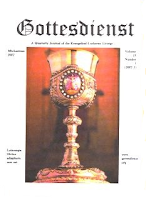The following quote comes from Pastor Burnell F.
Eckardt’s article in the Michaelmas 2011 issue of
Gottesdient titled
“Contemporary Worship, the Anabaptists, and the Hindus.” Before we get to the quote though, I’d like
to throw in a quick plug for
Gottesdienst.
Gottesdienst
is an insightful journal, packed with great writing and a variety of topics
related to the Lutheran Liturgy. If you’re
a confessional Lutheran, you’ll probably like it. And don’t worry, you don’t have to be a
Gottesdienster to read it (I’ll leave it to you to figure out what a
Gottesdienster is). Dare I say you might
even
enjoy it – Father Eckardt, the
Editor-in-Chief, does have a flair for “stimulating” conversation between
Gottesdiensters and those of other "liturgical persuasions." You can subscribe at
the Gottesdient website, as
well as check out
the
Gottesdienst Online blog. Here’s the
quote, reprinted with permission:
Remember
the old George Harrison song “My Sweet Lord”? Consider these lyrics:
I really want to know you
Really want to go with you
Really want to show you lord
That it won’t take long, my lord (hallelujah)
My sweet lord (hallelujah)
Hm, my lord (hallelujah)
My sweet lord (hallelujah)
Anything objectionable there? Of course not, in fact it sounds rather
indistinguishable from the kind of thing you might hear from a praise
band. Unless, that is, you happen to
know about the background singers’ prayer that comes in later in the song: “hare krishna, hare krishna, krishna
krishna, hare hare, Gurur Brahma, Gurur Vishnu, Gurur Devo, Maheshwara, Gurur
Sakshaat, Parabrahma, Tasmayi Shree, Guruve Namah, Hare Rama, hare krishna…”
And that, dear friends, comes from the
Bhagavad-Gita, a seminal poem that forms the basis of Hinduism. Repetition of the mantra is said to be the
“sublime method for reviving our Krishna consciousness” (
www.krishna.com). Here’s the explanation of the mantra from
Krishna.com:
As living spiritual souls we are all originally Krishna
conscious entities, but due to our association with matter from time
immemorial, our consciousness is now polluted by material atmosphere. In this polluted concept of life, we are all
trying to exploit the resources of material nature, but actually we are
becoming more and more entangled in her complexities. This illusion is called
maya, or hard struggle for existence for winning over the stringent
laws of material nature. This illusory
struggle against the material nature can at once be stopped by revival of our Krishna
consciousness. (
www.krishna.com/content/transcendental-vibration)
No Christian should have any difficulty recognizing
the odious character of that kind of thinking, but how many would recognize it
for what it is if it’s left in the background, untranslated, while the banal
English lyrics are made the heart of this popular song? In fact, Gospel singer
BeBe Winans took this very song and removed the Krishna references and added in
their place, “You’re the Mighty One, You’re the Prince of Peace, You’re the
First and the Last, You’re the Great I AM, and the Precious Lamb,” as though
that would somehow baptize this song for use among Christians. And for many, that sort of thing works just
fine, because it’s all really about the mood anyhow, about making the
experiential connection with Jesus.
And this
provides opportunity to address again a central failure of the contemporary
worship mentality to understand that the means of grace are not the experiences
of the Christian, but the words of the Holy Gospel.
This
gets to the heart of that quotation from the Apology about fanatical men who
dream that the Holy Ghost comes to them if they sit and wait for
illumination. “Fanatics” have the
theological problem of failing to recognize that the real point of contact that
a Christian has with God is only the Word of God, and of replacing that link
with personal experience. And when
personal experience, particularly when that experience is tied to emotion,
becomes the driving force in determining the legitimacy of one’s views, it can
be a very dangerous thing indeed. The
self-control of which the apostle Paul speaks is particularly the control of
one’s emotions: the Greek enkrateia (ἐγ + ϰϱάτεια) is derived from krateia: strength. Self-mastery
has to do with keeping oneself constrained; that is, with keeping the emotive
drives in check.
This is not to say that emotion has no
place in worship; on the contrary, worship of the noblest kind can be very
emotional, since the comfort of the Gospel is bound to have an effect on the
depths of one’s soul; and hence it is all the more necessary to take great care
to distinguish worship centered in the Gospel itself from worship centered in
the emotions. The latter kind, when
called Christian, is nothing more than a Trojan horse in which enters the
mischief of a false faith rooted in something other than the Word of God.
So then, not only is true faith at odds
with the natural will (as this column sought to demonstrate in the previous
issue), it is also inseparably bound to the Word of God. Christian faith is dependent upon the Gospel
not only at its inception, but for its sustenance. The Gospel itself must form the heart and
nucleus of all Christian worship, and therefore nebulous or simplistic
emotional “encounters” cannot be allowed as replacements. Nor, then, can the kind of music that lends
itself so easily to the repetition of Hindu mantras ever become compatible with
what is truly Christian.







No comments:
Post a Comment